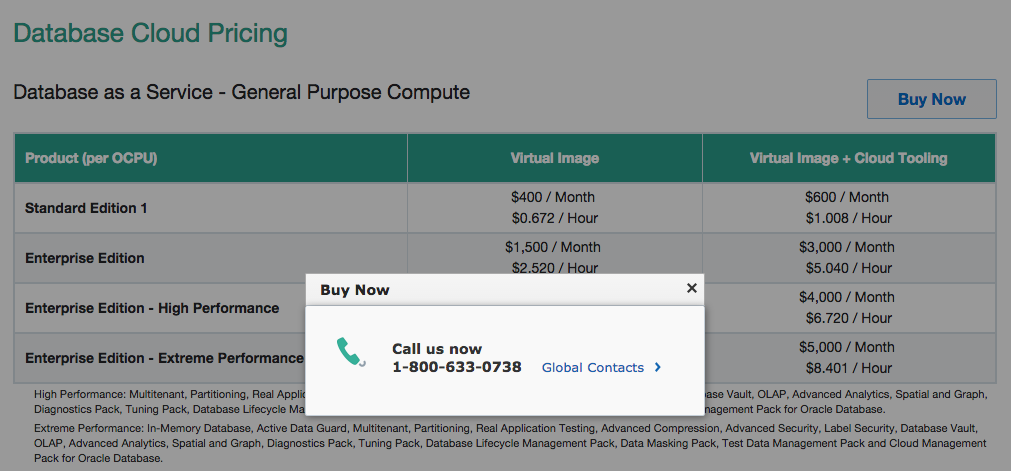
Oracle still doesn’t get cloud computing. At Oracle OpenWorld this week, there were signs that Oracle was making serious changes to its business model, embracing cloud computing in a way that it hitherto hasn’t. Unfortunately, a review of what Oracle announced suggests that it has a long way to go before Oracle’s cloud becomes anything more than Larry Ellison’s derisive “water vapor.”
Of course, Oracle was never going to be able to compete with Amazon in the cloud. That’s a bridge too far for a company that has spent decades licensing software. Lots of it.
Even so, if Oracle truly wants to better understand how to turn a massive, legacy data center business and orient it to the cloud, it need look no further than Microsoft.
Oracle’s “Inconceivable” Cloud
Give points to Oracle chairman Larry Ellison: he knows how to put on a good show. Accuracy, however, isn’t always his strength.
In the midst of his keynote, he slagged SAP for not powering any clouds but then went a bit too far, as CSC’s Simon Wardley points out:
“Virtually every important cloud service on the planet earth runs on the Oracle database” – really? AWS, GooG and MSFT run on Oracle?
— Simon Wardley (@swardley) September 30, 2014
Ellison, of course, referred to a few software-as-a-service applications. But when most people think of “cloud,” many (most?) think of the infrastructure-as-a-service (IaaS) or platform-as-a-service offerings that applications run on. Those overwhelmingly do not run on Oracle.
But that’s semantics. The real problem with Oracle’s cloud announcements wasn’t the smearing of competitors or the grandiose boasts. It was the cloud, or lack thereof.
For example, what Oracle calls a database-as-a-service (DBaaS) really … isn’t. It’s actually a hosted compute environment with software and support rented by the month. It’s also not fully managed, though Oracle suggests this will change in the future.
Most bizarrely, one of the cardinal advantages of true cloud computing is the way it lets developers set up virtual servers themselves. Perhaps more than any other feature, such convenience has driven the adoption of AWS and other cloud services. Developers don’t want to have to talk to a salesperson in order to get stuff done. Yet clicking on Oracle’s “buy now” button on the DBaaS page reveals this “feature”:

All of which leads developer Jeff Waugh to channel The Princess Bride:
@mjasay @swardley “Larry, you keep saying that word, ‘Cloud’… I do not think it means what you think it means.”
— Jeff Waugh (@jdub) September 30, 2014
It doesn’t have to be this way. Just ask Microsoft.
Microsoft’s Cloud Moment
Microsoft is very similar to Oracle in many ways. It, too, has a large software business that it wants to protect, even as it searches for ways to be relevant for an increasingly cloud-centric world.
But Microsoft’s approach has been very different from Oracle’s. Unlike Oracle, Microsoft has actually delivered a host of software services that aren’t simply its old licensed software business dressed up in cloudy clothes. One area that is particularly impressive is Microsoft’s different databases it runs as services, including SQL Server and a new DocumentDB.
Of the latter, which has the potential to eat into Microsoft’s legacy database business, DataStax and Windows Azure MVP Kelly Sommers indicates that Microsoft built it right:
If you think creating a cloud database service is sticking some database nodes up in some VMs & you automate node creation you’re on crack.
— Kelly Sommers (@kellabyte) September 26, 2014
In a series of other tweets, she goes on to confirm that “The Microsoft Azure DocumentDB folks really know what they’re doing. Some really great database and distributed systems engineering in there.”
But more than the engineering, Microsoft got the business model right. Microsoft’s cloud services, including its database services, are just that: services. Users self-provision. The databases are fully managed.
And unlike Oracle, Microsoft has made open source a first-class citizen on its Azure cloud (the list of open-source software on Azure is impressive).
Competing In The Cloud
All of which is why I continue to believe Microsoft has a real chance to compete effectively in the cloud. Despite its legacy, Microsoft has demonstrated the ability to transform itself. Oracle, at least on the basis of its recent cloud announcements, has not.
Just as important, however, is Microsoft’s commitment to lowering the bar to computing. Just as Steven Pinker says of bad writing—”The curse of knowledge is the single best explanation of why good people write bad prose. It simply doesn’t occur to the writer that her readers don’t know what she knows”—so, too, is it with software.
Too many software infrastructure developers assume too great a familiarity with the underlying code. Not so Microsoft, as Bill Bennett highlights: “Microsoft has created a cloud computing service that makes creating a server as simple as setting up a Word document.”
Not everyone will want this, of course. But Microsoft keeps demonstrating that it understands the cloud and its developer audience very, very well. Oracle could learn a thing or 20 from Microsoft.
Image courtesy of Shutterstock
















